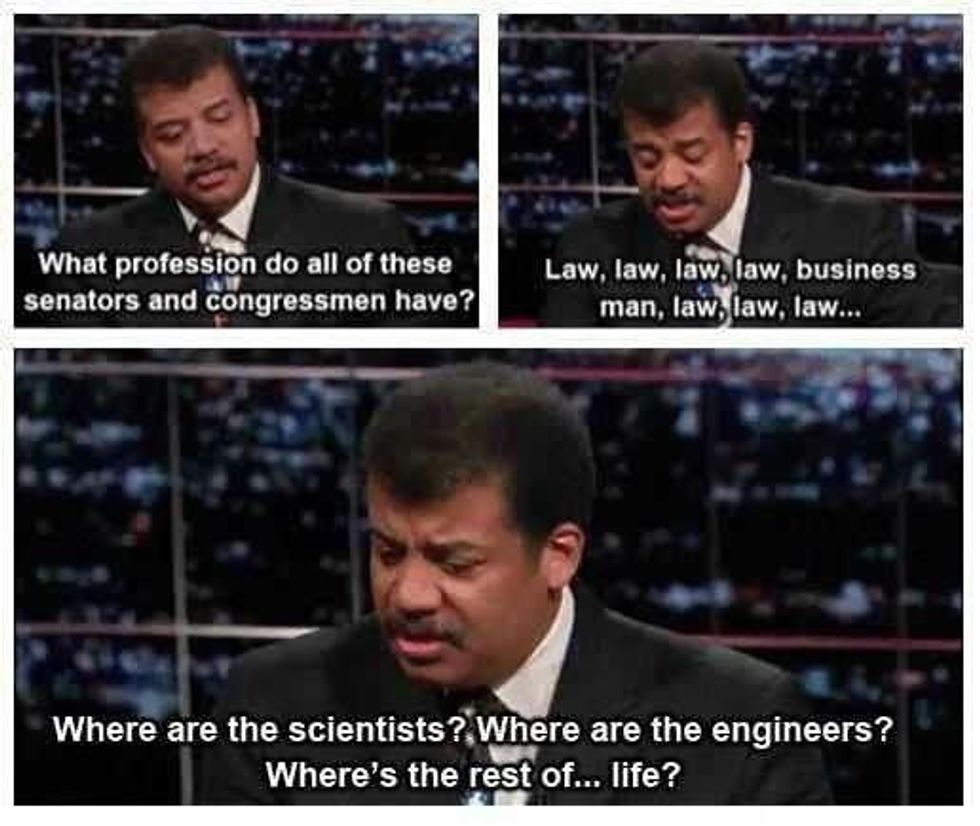I think that America has come to a point in our political narrative to redefine what qualifies someone to become a leader in our country. This year we have seen people, from Ben Carson to John McAfee to the infamous Donald, running for the highest office without any prior experience that, in the past, would have been seen as completely necessary. What, then, should we make of this new trend? Should we continue the trend of talking about how they have no experience - focusing not on what they have done, but on what they have not done. I do not think we should. It's time that we redefine the experience necessary to be a politician in America.
As the wonderful Neil deGrasse Tyson put it, politicians don't really represent life. They represent a very small section of professionals who have, historically, been accepted as the people who will run our country. But the rest of life needs to be let in. There is nothing in being a lawyer that makes them innately better at being a politician, because they are often presented with issues and ideas that have nothing to do with the degree they got. Why else would they have aides who help them? So, if a law degree does not equate to innately being a good politician, why shouldn't we allow other professions into the field?
But, if we are trying to let other professions into the political sphere, we must accept that we can not continue judging them on the same standards we've judged career politicians on. In today's political sphere, candidates are often judged based on what they have done in politics in the past. This does not make sense. While it is true that, when running for a legislative role, legislative experience certainly will help you do your job well, it does not necessarily mean that it is the pinnacle of experience. Other people, in other fields, may be capable and very good at picking up on the minutia of legislative jobs. I don't think that anyone in the world, regardless of how long they have been in any office, could say that they are prepared for the trials that the President faces, until they are actually the President and have that pressure on their shoulders. For these reasons, presenting newcomers to politics as "inexperienced" is a ludicrous notion.
I truly believe that there are many people in America who would make fabulous politicians, who never consider it as an option. All it takes is common sense, at least above average intelligence, and an understanding of the job that you are hoping to be elected to. More than that, though, candidate's histories should be analyzed on an individual level. No profession is exactly the same and so there is no cookie cutter process for determining whether someone would be a good politician or not, although the current media uses this cookie cutter method. If they are a business person, let's analyze their business record and see how well they have handled their money. If they are a doctor, lets look at their beliefs on mental health. If they are an athlete, lets look at their community involvement. A person should not be judged based on a career path that they chose not to pursue. All of this, of course, should not imply that I want to preclude lawyers from entering politics. I, at this point in my life, plan on being a lawyer and entering politics so that I can help others. But I welcome the American people to choose the candidate that they feel will best serve them in office even if that's not me; not the one who went to the best law school. It's time for America to realize that politicians do not have to be lawyers - rather, just good and intelligent people.
So then, who should we preclude? This is not a simple question and it does not have a simple answer. The people that we should not vote for are those people that you do not want representing you. There is a simple trick that I sometimes think of when I analyze a candidate. Would you want to introduce them to your parents as your boss? Play that out in your head. Would they make a good impression? Are they able to hold a conversation without going off on crazy tangents that lead to almost no where? Can they participate in an educated conversation? How about a normal conversation? Do they say things that would embarrass you, like racist, misogynist, or bigoted comments? If you think it over, look into the candidate and watch what they say, it should not be that hard. For instance, when Ben Carson said that the pyramids were used to store grain, he instantly became not qualified to be President in my mind. If America began to use a competency level as an indicator for whether or not a candidate can be trusted, we would be in a much better place.












































